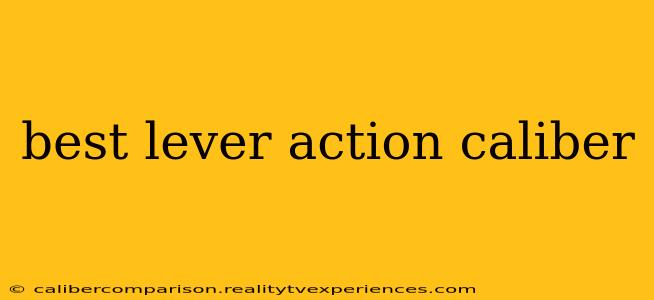Choosing the best lever-action caliber depends heavily on your intended use. Whether you're hunting deer in thick woods, plinking at the range, or defending your homestead, the ideal cartridge will vary significantly. This guide explores popular lever-action calibers, highlighting their strengths and weaknesses to help you make an informed decision.
Understanding Caliber Selection Factors
Before diving into specific calibers, let's consider the key factors influencing your choice:
-
Intended Use: Hunting large game requires a powerful cartridge with significant stopping power. Smaller game hunting or target shooting allows for less powerful, often more economical, options. Self-defense considerations involve different factors, including bullet penetration and expansion characteristics.
-
Range: Longer-range shooting demands flatter-shooting cartridges with less bullet drop. Close-quarters scenarios benefit from cartridges designed for maximum stopping power at shorter distances.
-
Recoil: Heavier calibers produce more recoil, which can be fatiguing during extended shooting sessions. Consider your tolerance for recoil when making your selection.
-
Availability and Cost: Ammunition availability and cost can be significant factors. Some calibers are more readily available and less expensive than others.
-
Rifle Availability: Not all lever-action rifles are chambered in every caliber. Ensure your chosen caliber is compatible with the rifles you are considering.
Top Lever Action Calibers: A Detailed Look
Here's a breakdown of some of the most popular and effective lever-action calibers:
1. .30-30 Winchester: The Classic Workhorse
The .30-30 Winchester is arguably the most iconic lever-action caliber. Its widespread availability, manageable recoil, and effectiveness on deer-sized game have cemented its place in history.
- Pros: Affordable ammunition, readily available, good accuracy at hunting ranges, manageable recoil, effective on deer and smaller game.
- Cons: Limited range compared to some other calibers, relatively lower velocity.
2. .45-70 Government: The Big-Bore Contender
The .45-70 Government is a powerful round known for its heavy recoil and impressive stopping power. This makes it a solid choice for larger game.
- Pros: Excellent stopping power, effective on large game, suitable for hunting at longer ranges (with appropriate ammunition selection), historical significance.
- Cons: Significant recoil, heavier ammunition, can be expensive, limited capacity in many lever-action rifles.
3. .44 Magnum: Versatile and Powerful
The .44 Magnum offers a compelling blend of power and versatility. It's effective for hunting medium-sized game and suitable for self-defense.
- Pros: Powerful stopping power, relatively flat trajectory, widely available, suitable for hunting medium-sized game and self-defense.
- Cons: Can be more expensive than .30-30, noticeable recoil.
4. .357 Magnum: A Compact and Versatile Option
The .357 Magnum is a smaller, more manageable caliber, making it an attractive option for those who prioritize less recoil.
- Pros: Lower recoil than .44 Magnum and .45-70, suitable for self-defense, effective on smaller game.
- Cons: Less powerful than larger calibers, suitable for smaller to medium-sized game only.
5. .223 Remington/.556 NATO: Modern Versatility
While less traditional for lever-action rifles, the .223 Remington/.556 NATO is gaining popularity. It offers flat trajectory and good accuracy, making it useful for longer-range shooting and smaller game hunting.
- Pros: Flat trajectory, high velocity, good accuracy, readily available ammunition.
- Cons: May not be suitable for larger game hunting, recoil can be felt differently depending on gun and ammunition chosen.
Conclusion: Choosing Your Best Lever-Action Caliber
Ultimately, the "best" lever-action caliber is subjective and depends entirely on your individual needs and preferences. Carefully consider your intended use, desired range, recoil tolerance, ammunition availability, and rifle availability before making your decision. Research different cartridges thoroughly and, if possible, try shooting several calibers to get a feel for their recoil and handling before investing in a rifle. This approach will ensure you choose the perfect caliber for your needs, maximizing your enjoyment and success.

